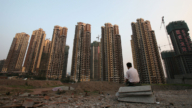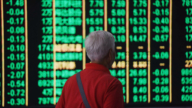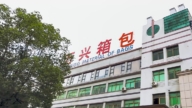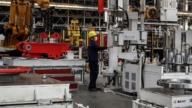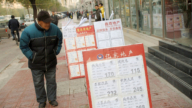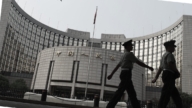【新唐人2015年01月13日讯】一些经济专家最近对2015年的中国经济进行预测,发现中国经济问题的关键词在于“风险”,体现在多个方面。有分析指出,中国经济看似稳定,其实已经超过临界点,所有致命的因素都在加剧。
《彭博新闻社》在去年的12月18号指出,中国经济若想维持7%的增长,中共当局必须关注六大方面:信贷紧锁、房地产下滑、外部冲击、政策失误、地方政府债务危机,以及美国利率上升。
美国咨商会驻北京经济学家Andrew Polk向《彭博新闻社》表示,信贷紧缩的三个可能催化剂是:影子银行发生大面积违约;三个月内房价暴跌10%;美联储加息引发资本外流,导致银行流动性降低。
北大金融学教授Michael Pettis表示,外部冲击可能来自欧洲或其他地方,将导致中国企业减少投资。如果再加上坏账的延期付款,可能影响新增信贷的增长,使其不足以支持经济增长。
1月9号,英国《金融时报》中文网财经专栏作家徐瑾指出,2015年中国经济的风险主要体现在五个方面。首先在于国际环境动荡,强势美元伴随着资本回流美国,如果此时此刻美联储加息,将导致中国的资本外逃。此外,在经济下行的情况下,随着土地出让金收入减少,地方政府收入增长将只有2.2%左右。今年即使翻倍发债,也不足以应付地方债务还本付息需求。
美国南卡罗莱纳大学艾肯商学院教授谢田:“我觉得最危险的是银行坏帐,尤其是跟房地产相关这个部位的坏帐,他们可能会因为房地产泡沫的破灭而引发,这个可能是最大的危险。地方债务的问题是另一个危险,还一个就是,如果世界经济进一步下滑,中国制造业进一步萎缩,有更多的企业倒闭,引发失业浪潮的话,这个对中共也是一个大的危险。”
美国南卡罗莱纳大学艾肯商学院教授谢田指出,中国经济已经处在一种超临界的状态。
谢田:“它实际上已经过了临界点,应该爆破了,但是它还没有,看来稳定的状态,但是所有那些致命的因素都在加剧。我们提到最主要的问题,房地产泡沫和地方债的问题和失业率的问题,这三点可能会由外界其他因素来诱发。比方说美联储突然升息,导致美元回流,这可能是一个冲击的因素。这些看起来小小的问题,在中国经济超临界的状态下,都可能成为引发经济崩溃的根源。”
北京科技大学东凌经济管理学院教授何维达撰文指出,2015年,制造业、采矿业、电力、运输等,受国外经济复苏缓慢、国内产能过剩影响,持续下滑的趋势难以根本改善。此外,房地产量价齐跌,购房者可能因此撤离,导致价格进一步下跌。
何维达还指出,地级市、县(市)、镇三级地方政府,存在大规模举债建设“新区”或各类“园区”的同时,地方融资平台的债务总量也在不断累加,加上缺乏有效监控,出现地方债务危机的可能性增大。
浙江财经大学经济与国际贸易学院教授谢作诗:“地方债务和影子银行这一块,是比较严重的。中国经济确实各方面出现了问题,泡沫化去杠杆的过程中是有问题,但我不认为05年经济,就是这些问题爆发出来,就引起经济崩盘。政府手上还有很多空间,救市啊,虽然我们知道长期救不了市,但是短期可以稍微拖一拖。”
北京国情内参首席研究员巩胜利认为,2015年中国最大的麻烦是货币问题。
巩胜利:“按国民生产总值产出来说,中国的货币投放已经是占了全球的一半以上了。但是,(上)星期五中国政府公布了一个数据,中国的通缩已经到来。发了大量的货币,却在紧缩,这是一个前所未有的难题。(上)星期五国家发改委投资司的司长讲了,中国今年计划是7万亿的大投入,这样下去后,货币情况不知道是什么样,这样一分析,可能货币的问题比其他问题都要严峻的多。”
《彭博新闻社》1月8号的报导披露,中共国务院去年底批准的七大类基础设施项目,总投资额逾10万亿元人民币,其中今年投资超过7万亿元。
而在2008年金融危机后,中共当局出台4万亿元的经济刺激计划,造成多个行业产能过剩,也导致了从2010年开始的房价飞涨。大陆知名经济学家吴敬琏曾痛批,每当宏观经济出现问题,中共总是动员海量资源投入去救市,这是饮鸩止渴的办法,将使宏观经济状况变得越来越脆弱。
采访/易如 编辑/陈洁 后制/陈建铭
“Risk" is Khe Key Word For China’s Economy in 2015,
Say Scholars.
“Risk" has become the key word in recent predictions
about China’s economic prospective in 2015.
Scholars say people will see risks in many aspects
of China’s economy.
Although appearing to be stable, China’s economy has
virtually exceeded its critical point.
All risk factors will only worsen in the upcoming year.
A Bloomberg report on Dec.18 2014 said, “to ensure China
achieves growth of about 7 percent next year", the Chinese
Communist Party (CCP) must watch on the following aspects:
Credit crunch, home buyers strike, external shock;
Policy miscalculation, local government debt shakeout; and
rising U.S. interest rates.
The Conference Board’s Beijing-based economist, Andrew
Polk, told Bloomberg “three catalysts may potentially disrupt
the supply of credit".
They are: “a large default in the shadow banking sector “;
“a 10 percent plunge in property prices within three months";
And “a contraction in bank liquidity due to capital outflows
in the face of tightening by the Federal Reserve".
Michael Pettis, a finance professor at Peking University, said
an external shock may come from Europe or elsewhere and
lead to disinvestment of China’s businesses.
A large need to rollover bad loans may also prevent “China
from generating enough new credit to maintain growth rates".
On Jan.9, The FT Chinese columnist Xu Jin published an article
that China’s economic risks will be observed in five aspects.
First of all, the turbulent international situation will
encourage return of investment in dollars to the U.S..
If the Federal Reserve raises its interest rate at the moment,
China will probably see mass capital flight.
Another factor is plummeting land sales
due to economic slowdown.
Xu estimates that the revenue of local CCP governments
may only increase by 2.2% in 2015.
This means, even doubling bonds issuance will not be able
to afford the interest rates on local government debts.
Prof. Xie Tian, Aiken Business School, Univ. of S. Carolina,
“I think the biggest danger lies in bad debts of banks,
especially those linked to the real estate industry.
These kinds of bad debts may balloon if the housing bubble
bursts. This can be the most dangerous scenario.
Risks also result from local debt problems or global
economic decline.
The latter may lead to further shrinkage of
China’s manufacturing industry.
If more companies are shut down and more people lose their
jobs, it is also a huge challenge for the CCP’s regime to survive."
Xie Tian also commented that, China’s economy has
already exceeded its critical point.
Xie Tian,"Indeed China’s economy already exceeds its
critical point and should have collapsed.
But somehow it still appears to be stable.
Even though, all those critical problems are still
becoming worse.
We just mentioned three biggest problems, housing bubble,
local government debts and rising unemployment rates.
These problems may increase due to external factors.
For example, if the Federal Reserve raises its interest rate,
dollars will return to the U.S. and China’s economy can be
shaken by this.
It may seem trivial, but they could be the fuse of economic
breakdown as China’s economy exceeds its critical point."
Prof. He Weida, Dongling School of Economics and
Management, USTB, said China’s manufacturing, mining,
power and transportation industry could continue to slide
in a slow global economic recovery and domestic overcapacity.
Falling quantities and prices will lead to house buyer strikes,
causeing house prices to drop further, said He.
He Weida also commented that, local municipal, county and
township governments had conducted massive construction
of “new residency communities" though bank borrowing.
The overall scale of local debts keeps increasing, without any
effective control or management.
He said, this greatly increased the risk of local debt crisis.
Prof. Xie Zuoshi, Zhejiang University of Finance & Economics,
“Local debt and shadow bank problems are pretty bad now.
China’s economy is truly seeing problems in many aspects,
such as in leveraging process.
However, I don’t think China’s economy will collapse in 2015.
The government still has some space to rescue the market
or do something else.
We all know that this will not work in the long term,
but it can relieve the pain in the short-term."
Gong Shengli, Chief Researcher of Guoqing Neican Journal,
believes that the biggest problems of China’s economy
in 2015 are monetary ones.
Gong Shengli, “If weighed by GDP, the CCP already has more
than half of the world’s monetary base.
However, last Friday the CCP officially announced deflation
in China’s economy.
Overprinting money and in the meantime deflation?
This is a puzzle that we have never seen.
Investment director of National Development and Reform
Commission said 7 trillion Yuan will be spent this year.
Nobody knows what the monetary situation will become
after this.
Maybe monetary issues are even worse than
other economic problems for the CCP."
A Bloomberg report on Jan.8 said, the CCP’s State Council
approved a 10-trillion Yuan plan for infrastructure projects
in seven key areas last year.
About 7 trillion Yuan ($1.1 trillion) will be spent in 2015.
The CCP released a 4-trillion Yuan stimulus plan in response
to the global financial crisis in 2008.
This has led to overcapacity in many industries and
the following house price surge since 2010.
Renowned Chinese economist Wu Jinglian seriously
criticized such a strategy.
Wu said the CCP always used numerous resources to rescue
the market when there were problems in macroeconomics;
Such moves only give temporary relief but ultimately create
an extremely delicate macroeconomics situation in China.
Interview/YiRu Edit/ChenJie Post-Production/Chen Jianming



